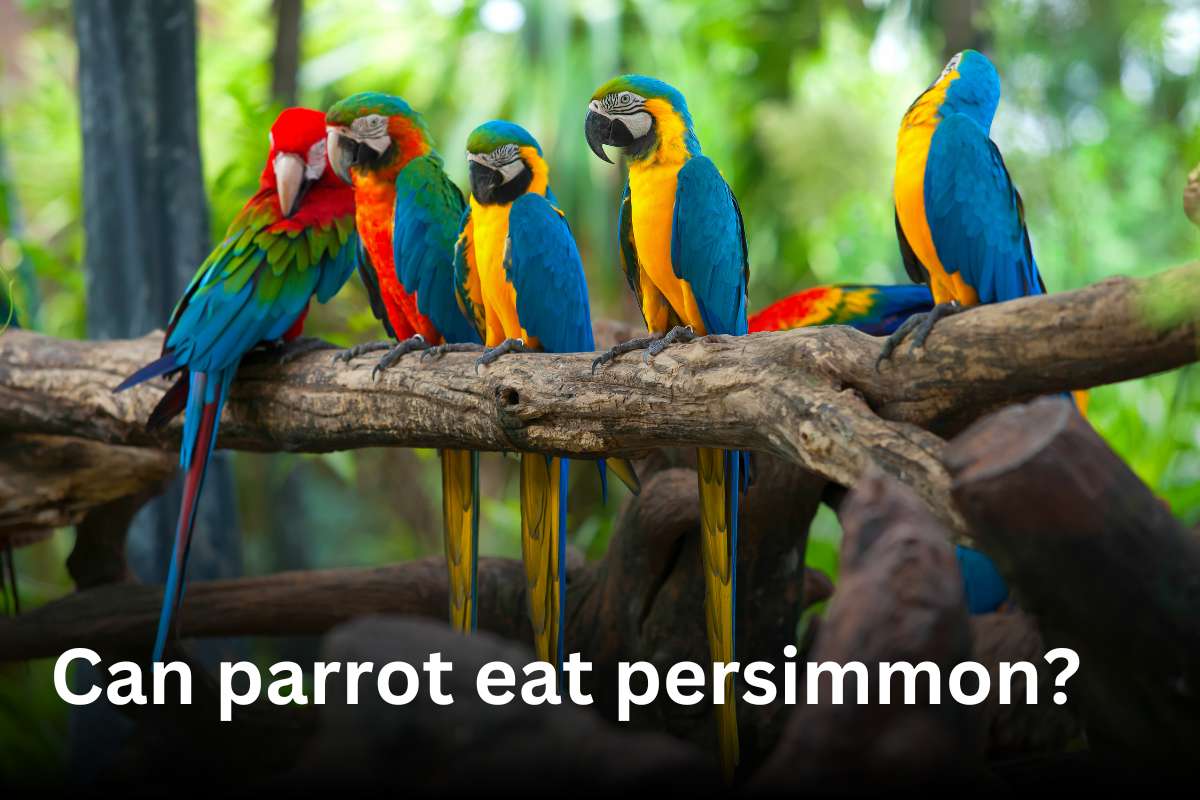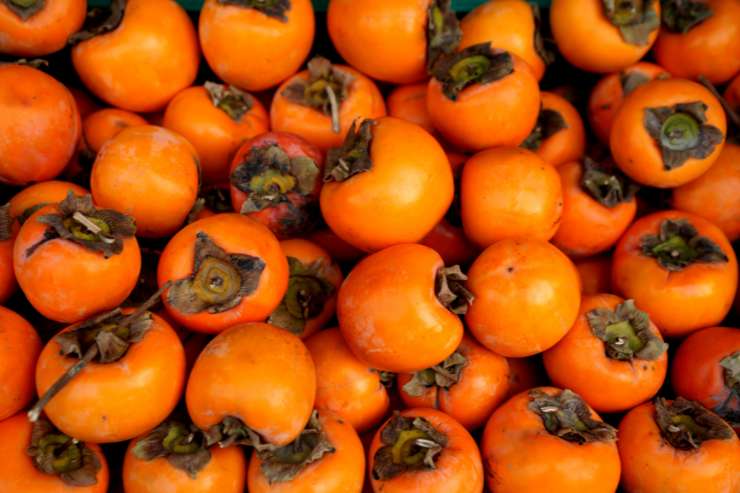Can parrot eat persimmon?

Persimmons are wonderful fruits that many people appreciate, but it is essential to examine their compatibility with parrots.
These birds enjoy a diverse diet that includes fruits for nutrition and enrichment, but not all foods are safe for them.
Persimmons provide vitamins and fibre. However, their high sugar content and oxalic levels are risky.
To properly incorporate persimmons into a parrot’s diet, serve them as a treat on occasion, remove the seeds, and keep an eye out for any bad responses.

Always put your parrot’s health first, and visit a veterinarian for specialized nutrition recommendations.
This article explores whether persimmons can be part of a parrot’s diet, their nutritional benefits, potential risks, and how to introduce them if suitable safely.
What is Persimmon?
Persimmons are fruits that come in several varieties, including the popular Fuyu and Hachiya types.
They are native to East Asia but are grown and loved all over the world for their sweet, tasty flesh. Persimmons are high in vitamins, minerals, and dietary fibre, making them a healthy snack.
Nutritional Value of Persimmon
Persimmons are high in essential nutrients, providing health benefits for those who consume them. They are exceptionally high in:
- Vitamin A, a crucial nutrient found in persimmons, plays a key role in maintaining vision, immunity, and skin health, providing a reassuring boost to your overall well-being.
- Vitamin C is an antioxidant that strengthens the immune system and promotes collagen formation.
- Dietary fibre promotes digestive health and lowers blood sugar levels.
- Potassium is essential for heart health and muscular function.
If given in enough amounts, these nutrients improve the overall health and well-being of both humans and, presumably, parrots.
Read More: How to Attract Parrots To Your Yard?>>>>
Can Parrot Eat Persimmon?
When determining whether persimmons are appropriate for parrots, numerous things must be considered:
Digestive System: These birds’ digestive systems are delicate, and they may be unable to eat all fruits. Persimmons, especially when ripe, contain a high concentration of natural sugars and fibre, which might impair digestion if ingested in excess.

Nutritional worth: Persimmons provide beneficial nutrients like vitamins A and C, although they are not an essential food requirement for parrots. These species require a balanced diet consisting of seeds, pellets, nuts, vegetables, and fruits in moderation.
Oxalic acid content: Some fruits, especially persimmons, contain oxalic acid, which in large quantities might interfere with calcium absorption and contribute to kidney difficulties in parrots.
Benefits of Including Persimmons in Parrot Diet
When eaten in moderation, persimmons can add diversity and enrichment to a parrot’s diet. The benefits of parrot-eating persimmons are as follows:
Vitamin Enrichment
Vitamin A: Persimmons are high in vitamin A, which is required for good vision, a robust immune system, and correct cell activity in parrots.
Vitamin C: This antioxidant improves the immune system, enhances wound healing, and improves iron absorption from the diet.
Dietary Fiber
Persimmons are high in dietary fibre, which promotes digestion and helps parrots avoid constipation. Fiber is needed for a healthy digestive system.
Palatability and Enrichment
Due to their sweet and juicy flavour, persimmons are a particularly appealing treat for parrots. Offering a diverse range of foods, including persimmons, can provide cerebral stimulation and enrichment, reducing monotony.
Antioxidants
Persimmons contain antioxidants such as beta-carotene and flavonoids, which can help parrots reduce oxidative stress and improve their overall health and longevity.
Hydration
Persimmons’ high water content can help with hydration, which is especially good during hot weather or for parrots who may not drink enough water.
Risks and Considerations
Feeding persimmons to parrots can be beneficial, but due to the potential risks involved, it’s vital to exercise caution.
Sugar Content:
Ripe persimmons contain a lot of natural sugars, which can result in obesity and other health problems if parrots eat them in excess.
Oxalic Acid:
As previously stated, persimmons contain oxalic acid, which can be harmful in big doses, perhaps causing kidney stones or other health difficulties in parrots.
Seeds and pits:
Like many other fruits, persimmons contain seeds and pits that can be harmful to parrots. Always remove these before feeding persimmons to your bird.
How to Safely Introduce Persimmons to Parrots?
If you decide to include persimmons in your parrot’s diet, follow these tips to guarantee safety and moderation.
Preparation: Thoroughly wash the persimmons to remove any pesticides or residues before feeding to your parrot.
Portion Control: Serve persimmons as a treat rather than a staple food. Limit the amount to a tiny piece or slice each serving, especially given the sugar content.
Monitor Response: After eating persimmons, check your parrot for any symptoms of digestive distress or allergic responses. If any harmful consequences develop, stop eating and consult your veterinarian.
Variety: Rotate persimmons with other fruits and vegetables to maintain a healthy diet and avoid repetition.
Conclusion
To summarize, while persimmons can be a delightful and nutritious supplement to a parrot’s diet when served in moderation, they should not replace critical components such as pellets and vegetables.
Understanding your parrot’s nutritional requirements and potential sensitivities is vital when introducing new meals.
Persimmons can be safely added to your bird’s diet as a treat on occasion if you follow proper instructions and watch their response.
Always put your parrot’s health first, and seek tailored food recommendations from an avian doctor.
Frequently Asked Question
Can parrots eat persimmons?
Yes, parrots can consume persimmons in balance. It’s critical to provide them as an occasional treat rather than a regular element of their diet.
What are the benefits of feeding persimmons to parrots?
Persimmons are high in vitamin A and C, dietary fiber, and antioxidants. They can assist to strengthen the immune system, improve vision, aid digestion, and give hydration.

